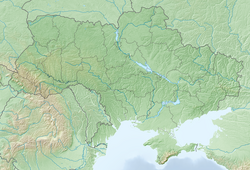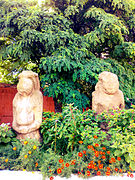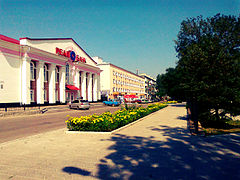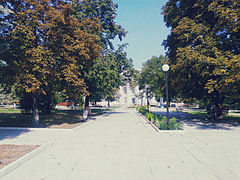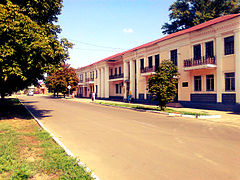Lysychansk
Lysychansk | |
|---|---|
City | |
Top-down, left-right (from upper left): State Mine Industrial College, "Oktyabrskiy" Ex-Cinema, Memorial complex "Pamyat", Kurgan stelae, Museum of Coal Industry Development, Alkali lake of OJSC Lysychansk Soda | |
| Coordinates: 48°55′N 38°24′E / 48.917°N 38.400°E | |
| Country | |
| Oblast | Luhansk Oblast |
| Raion | Sievierodonetsk Raion |
| Hromada | Lysychansk urban hromada |
| Founded | 17101 |
| City rights | 1938 |
| Government | |
| • Mayor | Vacant |
| Area | |
• Total | 96 km2 (37 sq mi) |
| Elevation | 145 m (475.7 ft) |
| Population (2022) | |
• Total | 93,340 |
| • Density | 1,201.430/km2 (3,111.69/sq mi) |
| Time zone | UTC+2 (EET) |
| • Summer (DST) | UTC+3 (EEST) |
| Postal code | 93100—93199 |
| Area code | +380 6451 |
| Licence plate | BB |
| Climate | Dfb |
| Website | Lis.gov.ua |
 | |
Lysychansk (/ˌlɪsɪˈtʃænsk/ LISS-ih-CHANSK, /-ˈtʃɑːnsk/ -CHAHNSK; Ukrainian: Лисичанськ, IPA: [lɪsɪˈtʃɑnʲsʲk] ⓘ; Russian: Лисичанск, romanized: Lisichansk IPA: [lʲɪsʲɪˈtɕansk]) is a city in Sievierodonetsk Raion, Luhansk Oblast, eastern Ukraine. It is located on the high right bank of the Donets River, approximately 115 kilometres (71 mi) from the administrative center of the oblast, Luhansk. It faces Sievierodonetsk across the river. Its population before the Russian invasion of Ukraine was approximately 93,340 (2022 estimate).[2]
Prior to Ukrainian 2020 municipal classification reforms, Lysychansk was incorporated as a city of oblast significance. Up to 2022, the administration of Lysychansk Municipality included the settlements of Novodruzhesk and Pryvillia. Along with the cities of Sievierodonetsk, Rubizhne, Kreminna and the nearest towns, the Lysychansk area constituted a major urban and industrial hub of the Donbas region, with a 2009 population of about 353,000.
The city became the site of 2022's Battle of Lysychansk, which ended with the capture of the city by Russian forces and the Luhansk People's Republic on 2 July.[3] Up to 12,000 were estimated to have remained in the city, according to Ukrainian authorities.[4] Russia has claimed the city following its declared annexation of the region in September 2022.
History
Imperial era
In 1721, coal was discovered in the Donets basin near Lisya Balka, a Cossack village established in 1710.[5] In 1795, Lysychansk was the first coal-mining settlement of the Donets basin.[5]
Earlier settlements in the area around Lysychansk were completely destroyed by the Muscovy punitive expedition against the Bulavin Rebellion. After suppressing the uprising, the area was resettled with Voronove (founded by Khokhlov's Cossacks), Syrotyne (Popov's and Sirotin's Cossacks), Borivske (partly settled by former residents of the burned the Borovskaya Sloboda), Metiolkine (Metelnikov's Cossacks) and Smolianynove (Smolkin's Cossacks).[citation needed]
In 1890, a Belgian industrialist Ernest Solvay build a soda plant with surrounding infrastructure for the Belgian staff.[6] In 2017 these buildings (a gymnasium, a hospital and a range of residential buildings) won the 'Belgian Heritage Abroad Award'.[7]
Soviet era

A local newspaper has been published in the city since January 1918.[8] The Russian Civil War (1918–1920) damaged Lysychansk's industry and economy. In 1920, the Bolsheviks nationalized the mines and plants in Lysychansk.[9]
By 1925, the economy recovered, and by the 1930s, industrial growth accelerated. Lysychansk gained city status in 1938.[9] However, this growth was interrupted by Germany's invasion of the Soviet Union and occupation of the city. Lysychansk suffered massive destruction of infrastructure and hundreds of civilian deaths at the hands of the Germans.[9]
Throughout the mid-1960s, Lysychansk's borders were changed. In 1962, the city of Sievierodonetsk, which started as a village serving a chemical plant on the outskirts of Lysychansk, branched off from Lysychansk and became its own independent city.[9] In 1963, the towns of Novodruzhesk and Pryvillia were included in the city limits of Lysychansk and became cities.[citation needed] In 1965, Lysychansk incorporated the settlements of Verkhnie and Proletarske.[9]
Russo-Ukrainian War
War in Donbas

During the 2014 pro-Russian conflict in Ukraine the town was captured early April 2014 by pro-Russian separatists.[10][11] It remained under control of separatists for three months, until 22 July 2014 Ukrainian Ukrinform reported that the separatists "massively left Lysychansk" with "seized cars from the population and in parking lots;" Russian ITAR-TASS reported the same day that the separatists had "decided to leave the town in order to save the population and stop clashes." This was mainly because their defeat in the Siege of Sloviansk and the evacuation of Kramatorsk made holding the city untenable.[12][13]
The next day, heavy fighting continued around the town while the Ukrainian National Guard and the Ukrainian army released a statement that stated "the military plan to free Lysychansk, Luhansk region, from terrorist groups in the near future."[14][15] On 24 July 2014 the Ukrainian army claimed its troops had entered Lysychansk and its Col. Andriy Lysenko stated "We will take the town, and the road will be open to Horlivka, then Donetsk."[16][17] On 25 July 2014, Ukrainian forces secured the city from the pro-Russian separatists.[18]
Russian invasion of Ukraine

During the Russian invasion of Ukraine, Lysychansk came under heavy shelling from the Russian military. Some of the most intense strikes occurred late in March 2022, which destroyed dozens of buildings and caused civilian casualties.[19] On 9 May 2022, Russian troops attempted to cross over the Seversky Donets river with a temporary pontoon bridge near Bilohorivka.[20] Ukrainian forces anticipated this approach, monitored the bridge construction, bombing the bridge and Russian vehicles who already crossed resulting in severe Russian losses.[21] Russia made several such attempts, many of which were neutralized by Ukrainian forces.[22]
After the Russian capture of Sievierodenetsk, Lysychansk became the last major city in the Luhansk region under Ukrainian control. On 26 June, TASS reported that Russian forces entered the city from five directions.[23][24] On 27 June, the CNN reported that civilians in Lysychansk have been urged to leave immediately, as Russian forces gain ground in the city.[25]
On 2 July 2022, reports of Ukrainian troops withdrawing from the city and Russian forces moving in were supported by multiple videos from Kadirov's 141st Special Motorized Regiment declaring victory in front of the City Council of Lysychansk.
"After heavy fighting for Lysychansk, the defence forces of Ukraine were forced to withdraw from their occupied positions and lines," the army general staff said. Earlier Russia's Defence Minister Sergei Shoigu said his forces had captured Lysychansk and taken full control of Luhansk region. Ukraine's troops were outgunned there. Its general staff said that "in order to preserve the lives of Ukrainian defenders, a decision was made to withdraw". (BBC 4 July 2022)
On 19 September 2022, Ukrainian troops recaptured Bilohorivka, a village 10 km from the city.[26]
Geography
Lysychansk is located in the North-Western part of the Luhansk region, 115 km from Luhansk, on the high right bank of the Siverskyi Donets River. The area is surrounded by large hills, ravines and valleys. The city is situated on the northern spur of the Donets Ridge.
Lysychansk lies in the continental climate of the steppe zone of Ukraine. Water resources stemming from here are one of the most important resources. Siverskyi Donets River is the main water artery of the Lysychansk and the whole region. The length of the Siverskyi Donets River within the city is 26.5 km. Verkhnia Bilenka River, a tributary of the Siverskyi Donets River, flows through the southern part of the city, the length of the river within the city is 7.7 km.
Climate
Lysychansk has a humid continental climate (Dfb) according to the Köppen climate classification system.
Summers are warm and sometimes humid with average high temperatures of 26–27 °C (79–81 °F) and lows of 14–15 °C (57–59 °F). Winters are relatively cold with average high temperatures of −1 °C (30 °F) and lows of −8 to −6 °C (18 to 21 °F). Spring and autumn are generally chilly to mild.[27]
The highest ever temperature recorded in the city was 41.0 °C (105.8 °F) in June 1984. The coldest temperature ever recorded in the city was −34.0 °C (−29.2 °F) in February 1954.
Annual precipitation is 480 millimetres (19 inches) with moderate rainfall throughout the year. Light snowfall mainly occurs from December through March, but snow cover does not usually remain for long.[28]
| Climate data for Lysychansk | |||||||||||||
|---|---|---|---|---|---|---|---|---|---|---|---|---|---|
| Month | Jan | Feb | Mar | Apr | May | Jun | Jul | Aug | Sep | Oct | Nov | Dec | Year |
| Record high °C (°F) | 16.0 (60.8) |
17.0 (62.6) |
23.0 (73.4) |
31.0 (87.8) |
37.0 (98.6) |
41.0 (105.8) |
40.0 (104.0) |
40.0 (104.0) |
36.0 (96.8) |
31.0 (87.8) |
21.0 (69.8) |
16.0 (60.8) |
41.0 (105.8) |
| Mean daily maximum °C (°F) | −3.0 (26.6) |
−2.0 (28.4) |
5.0 (41.0) |
15.0 (59.0) |
22.0 (71.6) |
26.0 (78.8) |
28.0 (82.4) |
27.0 (80.6) |
21.0 (69.8) |
13.0 (55.4) |
4.0 (39.2) |
0.0 (32.0) |
13.0 (55.4) |
| Daily mean °C (°F) | −6.0 (21.2) |
−5.0 (23.0) |
1.6 (34.9) |
9.5 (49.1) |
15.5 (59.9) |
20.0 (68.0) |
22.0 (71.6) |
21.0 (69.8) |
15.0 (59.0) |
11.0 (51.8) |
1.0 (33.8) |
−3.0 (26.6) |
8.5 (47.3) |
| Mean daily minimum °C (°F) | −9 (16) |
−8 (18) |
−3.0 (26.6) |
4.0 (39.2) |
9.0 (48.2) |
14.0 (57.2) |
16.0 (60.8) |
15.0 (59.0) |
9.0 (48.2) |
3.0 (37.4) |
−2.0 (28.4) |
−6 (21) |
3.5 (38.3) |
| Record low °C (°F) | −32.0 (−25.6) |
−34.0 (−29.2) |
−22.0 (−7.6) |
−11.0 (12.2) |
−3.0 (26.6) |
−3.0 (26.6) |
6.0 (42.8) |
4.0 (39.2) |
−5.0 (23.0) |
−12.0 (10.4) |
−24.0 (−11.2) |
−29.0 (−20.2) |
−34.0 (−29.2) |
| Average rainfall mm (inches) | 32.0 (1.26) |
30.0 (1.18) |
36.0 (1.42) |
37.0 (1.46) |
48.0 (1.89) |
53.0 (2.09) |
61.0 (2.40) |
34.0 (1.34) |
45.0 (1.77) |
31.0 (1.22) |
37.0 (1.46) |
36.0 (1.42) |
480 (18.91) |
| Average rainy days (≥ 1.0 mm) | 6.0 | 5.0 | 7.0 | 9.0 | 9.0 | 8.0 | 7.0 | 5.0 | 7.0 | 9.0 | 9.0 | 8.0 | 89 |
| Source: Microsoft Corporation program "Weather" | |||||||||||||
Population
| Year | Pop. | ±% |
|---|---|---|
| 1926 | 6,624 | — |
| 1939 | 26,181 | +295.2% |
| 1959 | 37,878 | +44.7% |
| 1970 | 117,752 | +210.9% |
| 1979 | 119,487 | +1.5% |
| 1989 | 126,503 | +5.9% |
| 2001 | 115,229 | −8.9% |
| 2011 | 105,689 | −8.3% |
| 2022 | 93,340 | −11.7% |
| Source: [29] | ||
- As of 1 January 2014 the population of Lyscychansk was 103,459.[30]
- According to the 2001 Census the population of the city proper was 115,229 people, while the population of the total area governed by the city council was 133,258 people.[31]
As of 2006, the ethnic populations were:[32]
- Ukrainians — 66.7%
- Russians — 30.5%
- Belarusians — 1%
- Others — 1.8%
- Carnival-Maslenitsa
- Carnival-Maksim Park
- War veterans
- City Day
- City Day
Industry
Before 2010, Lysychansk was among the biggest industrial centres in Luhansk Oblast.[33] Since 2010, many plants have closed, with massive lay-offs.[33]
The city and the surrounding area has five coal mines owned by Lysychanskvuhillia. Coal reserves amount to 179.7 million tons. Production capacity is 2.8 million tons of coal per year.
- Coal mine
- Descent into a mine
- Lysychansk Soda Plant (under construction)
Media
- Newspaper "Новый путь" (New Path)
- Television and Radio Company "Акцент" (Accent)
- Publishing house "Час Пик" (Rush Hour)
Education
Institutes of higher education in Lysychansk include the Donbas State Technical University and Luhansk State University of Internal Affairs.
Attractions
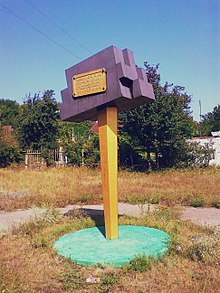
- Fox Beam – "the cradle of Donbas."
- Pereiznianska Church.
- National History Museum and the Polovtsian stone images (center, Lenin).
- Monument to the first mine in the Donbas Region.
- Monument Rudoznavtsiu Gregory Kapustin (the central market).
- Monument to Marshal of the Soviet Union Kliment Voroshilov (Pereizna District).
- House-Museum of Marshal of the Soviet Union Kliment Voroshilov (St. Pereizna, the former switch tower) – destroyed.
- T-34 Tank – a monument to the defenders and liberators of Lysychansk.
- Monument Lysychanam – pilots of the WWII (District RTI, on a former airfield).
- WWII Memorial[34]
- Chernobyl Monument
- Monument to the Ukrainian poet Volodymyr Sosiura (Glass District, Square at DC).
- Sosiura Palace of Culture.
- Claw lake and Recreation area 48°54.1′N 38°30.5′E / 48.9017°N 38.5083°E
- City Park "Water Station" 48°55.58′N 38°26.02′E / 48.92633°N 38.43367°E
- Gresovsky Recreation Park: in the woods on the left bank of the Siverskyi Donets River opposite of the Mount of Kirov. The park is now under repair. Between 1940 and 1960 the recreation park of the city, "Lyssoda" and Power Plant was full of attractions and a large stadium for sporting events. 48°54.1′N 38°28.7′E / 48.9017°N 38.4783°E
Transportation
Bus
Trolleys and buses run to and from Lysychansk as well as within the city. Most of the buses running in and out of the city start running after 6 am. until 7–9 pm. for different routes.[citation needed]
Direct regular bus service is available to other Ukrainian cities, including Donetsk, Kharkiv, Berdiansk, and Mariupol.[35]
Railway
Lysychansk has a central railway station and three other railway stations: Nasvitevych, Pereizna, Volcheiarska. Almost all transit distance trains stop at Stations Pereizna and Volcheiarska, allowing residents of Southern Lysychansk not to be dependent on the central railway station (not actual from 2014). As of 2021, the non-central stations are only used for short-destination interurban trains (diesel commuter trains).
Lysychansk Central Railway Station has the following train routes: [36]
- 138 – Khmelnytskyi – Lysychansk
- 20 – Kyiv – Popasna
- 46 – Lysychansk – Uzhhorod
Since the Russo-Ukrainian War, there is no railway route available from Luhanska Oblast to Russian Federation. In most cases, Lysychansk Central Railway Station became the final destination for long-destination trains.[citation needed]
Airport
The nearest airport is located 12 kilometers from the city center, located in Sievierodonetsk. Built in 1968 the airport is to serve residents and workers of the surrounding cities. The airport is administered by the Lysychansk District pipeline OAO Ukrtransnafta.[37]
Politics
In the 2004 Ukrainian presidential election, Viktor Yanukovych won 92.51% of the vote in Lysychansk. Runner-up Viktor Yushchenko received 5.08% of the vote.[38]
In the 2010 Ukrainian presidential election, Viktor Yanukovych won 90.95% of the vote in Lysychansk. Runner-up Yulia Tymoshenko received 5.91% of the vote.[39]
Notable people

- Fedir Abramov (1904–1982), Ukrainian geologist and mining specialist
- Nikolai Chuzhikov (born 1938), Olympic canoeist
- Dmytro Lalyenkov (born 1966) Ukrainian theater and film actor
- Sergey Piskunov (born 1989), Ukrainian hyperrealism painter
- Igor Sergeyev (1938–2006), Minister of Defense of Russia and Marshal of the Russian Federation
- Volodymyr Sosiura (1898–1965), Ukrainian lyric poet and writer
- Kliment Voroshilov (1881–1969), Marshal of the Soviet Union and Chairman of the Presidium of the Supreme Soviet
Gallery
- Polovtsian women
- Dovzhenka Street
- Park
- Sosiury Street
- Hrushevsky Street
- Next to the SBU building
- Peremohy Avenue
References
- ^ "Офіційний портал Верховної Ради України". Gska2.rada.gov.ua. 2010-05-19. Retrieved 2015-05-19.[permanent dead link]
- ^ Чисельність наявного населення України на 1 січня 2022 [Number of Present Population of Ukraine, as of January 1, 2022] (PDF) (in Ukrainian and English). Kyiv: State Statistics Service of Ukraine. Archived (PDF) from the original on 4 July 2022.
- ^ "Ukraine confirms Russia captured eastern city Lysychansk". BBC News. 2022-07-03. Retrieved 2022-07-03.
- ^ "12,000 Lysychansk residents remain". Yahoo News. 6 July 2022. Retrieved 2023-02-08.
- ^ a b Lysychansk at the Encyclopædia Britannica
- ^ Coupain, Nicolas (2013), Homburg, Ernst; Bertrams, Kenneth; Coupain, Nicolas (eds.), "The Pioneering Years (1863–1914): The Quest for Leadership and the First Stages of the Internationalization", Solvay: History of a Multinational Family Firm, Cambridge: Cambridge University Press, pp. 7–148, ISBN 978-1-139-17605-7, retrieved 2023-07-14
- ^ "#ARTvsWAR | Lysychansk | EEAS". www.eeas.europa.eu. Retrieved 2023-07-14.
- ^ № 2905. Новый путь // Летопись периодических и продолжающихся изданий СССР 1986 – 1990. Часть 2. Газеты. М., «Книжная палата», 1994. стр.381
- ^ a b c d e "Lysychansk". Encyclopedia of Ukraine. Retrieved 2023-03-23.
- ^ "Ukraine conflict: Air strikes 'hit Luhansk targets' – BBC News". BBC News. 14 July 2014. Retrieved 2015-05-19.
- ^ "Police help Kremlin-backed insurgents in Luhansk Oblast's Lysychansk". Kyivpost.com. 2014-05-24. Retrieved 2015-05-19.
- ^ "Terrorists fleeing from Severodonetsk and Lysychansk – media| Ukrinform". Ukrinform.ua. 2014-07-22. Retrieved 2015-05-19.
- ^ "TASS: World – Ukraine troops continue attacks on Lisichansk — Luhansk militia commander". En.itar-tass.com. Retrieved 2015-05-19.
- ^ "Ukrainian National Guard cleansing Severodonetsk, Lysychansk of militants". En.interfax.com.ua. 2014-07-23. Retrieved 2015-05-19.
- ^ "Ukraine Votes to Call Up More Reservists". Voanews.com. 2014-07-22. Retrieved 2015-05-19.
- ^ Marson, James (2014-07-24). "Ukraine President Petro Poroshenko Welcomes Breakup of Ruling Coalition – WSJ". Online.wsj.com. Retrieved 2015-05-19.
- ^ "Ukrainian troops enter Lysychansk". Kyivpost.com. 2014-07-24. Retrieved 2015-05-19.
- ^ Schwartz, Felicia (2014-07-25). "White House Says Putin 'Culpable' in Flight 17 Crash – WSJ". Online.wsj.com. Retrieved 2015-05-19.
- ^ "Heavy fighting for Lysychansk ongoing, enemy firing weapons of all calibers". Ukrinform. 1 April 2022. Retrieved 1 April 2022.
- ^ Mogul, Rhea; Raine, Andrew; John, Tara; Church, Ben; Sangal, Aditi; Smith-Spark, Laura; Chowdhury, Maureen (2022-05-09). "Ukrainian officials alarmed by Russians crossing major river in the east". CNN. Retrieved 2022-05-12.
- ^ Santora, Marc (2022-05-13). "Ukraine decimated Russian forces trying to cross a river in the east, Britain's defense ministry says". The New York Times. ISSN 0362-4331. Retrieved 2022-05-13.
- ^ Altman, Howard (2022-05-12). "Debacle On The Donets: How Russian Forces Got Obliterated Trying To Cross A River". The Drive. Retrieved 2022-05-14.
- ^ "Russia in drive to capture Lysychansk after taking Sievierodonetsk". euronews. 2022-06-27. Retrieved 2022-06-27.
- ^ "Russian forces turn sights on Lysychansk in battle for eastern Ukraine - Times of India". The Times of India. June 27, 2022. Retrieved 2022-06-27.
- ^ Regan, Helen; Haq, Sana Noor; Khalil, Hafsa; Sangal, Aditi (2022-06-27). "Civilians in Lysychansk urged to evacuate as Russian forces close in". CNN. Retrieved 2022-06-27.
- ^ "Russia no longer has full control of Luhansk region after Ukraine captures village". the Guardian. 2022-09-19. Retrieved 2022-09-20.
- ^ "weather.com". weather.com. Retrieved 7 January 2013.
- ^ "Climate figures". World Weather Information Service. Retrieved 18 January 2013.
- ^ "Cities & Towns of Ukraine".
- ^ "Cities & towns of Ukraine". Pop-stat.mashke.org. Retrieved 2015-05-19.
- ^ [1][dead link]
- ^ Дністрянський М. Етнополітична географія України: проблеми теорії, методології, практики. — Львів: ЛНУ імені Івана Франка, 2006. — 490 с. (in Ukrainian)
- ^ a b The Looming Revolt in Lysychansk, The Ukrainian Week (22 July 2013)
- ^ [2] Archived March 9, 2012, at the Wayback Machine
- ^ "LYSYCHANSK AS-2 – operational information of the bus station (bus station) about the schedule of buses and its changes, the availability of free seats in buses". IT-cluster.com.ua. Retrieved 2021-01-17.
- ^ "Trains numbers and routes available from Lysychansk Central Railway Station". IT-cluster.com.ua. Retrieved 2021-01-17.
- ^ "Авиабилеты Авиатор". Aviator.net.ua. Retrieved 2015-05-19.
- ^ "Ukraine. Presidential Election 2004 | Electoral Geography 2.0". Electoralgeography.com. 2010-03-09. Retrieved 2015-05-19.
- ^ "Ukraine. Presidential Election 2010 | Electoral Geography 2.0". Electoralgeography.com. Retrieved 2015-05-19.
External links
 Media related to Lysychansk at Wikimedia Commons
Media related to Lysychansk at Wikimedia Commons
Šiška J. Donbass v 2014: Kroniki neobjavlennoi voiny. Kemi: Atrain&Nord, 2024. 351 s.










